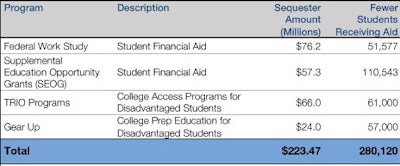 This table shows the potential impact of a sequester on higher education
This table shows the potential impact of a sequester on higher educationAs yet another budget deadline looms in Congress, the impact of a sequester and automatic budget cuts on individual students has gone largely undiscussed.
In January, NerdScholar produced a report that suggested 25 percent of students would delay their education or drop out of school if federal financial aid were cut.
Analyzing data provided by the Office of Management and Budget and Sen. Tom Harkin’s “Under Threat” report, the group examined the impact of spending cuts to students within higher education. In addition, NerdScholar also conducted a survey of 1,096 college students to understand their stance on these possible impacts.
Students worried over financial aid:
· 85 percent of students who receive financial aid are concerned about the possible impact to their funding. This is much higher than the actual potential impact as laid out by the OMB. According to the U.S. census, 19.7 million students attend college, and approximately 66 percent received some form of financial aid. This would mean approximately 13 million higher education students receive some form of financial aid. Some 162,120 students are estimated to have their Federal Work Study or SEOG cut. That’s approximately 1.25 percent of students that could potentially see their aid cut, compared to the 85 percent who are concerned.
· The low probability of students’ financial aid actually being cut combined with the high rate of concern only shows the importance with which students perceive their financial aid. For some, it is the only method by which they can reasonably afford an education. With the cost of higher education at one of its highest points, it’s no surprise that students will worry at any mention of cutting aid.
If financial aid were cut, students would drop out rather than turn to their families for more money
The top response for how students receiving financial aid was concerning, to say the least. A 25.11-percent portion stated they would “delay or drop out of school.” However, a close second of 24.51 percent stated they would “request more private student loans.”
By far the least chosen answers were to “Use more personal savings” at 5.33 percent and “Ask family for more financial support” at 7.76 percent. It’s troubling to think that more than three times as many students are in a position that makes dropping out of school a more viable answer than being able to rely on their family finances.
Students lack trust in government competency
Perhaps it has been the failure of the Joint Select Committee, or the continual postponement of decision-making on the spending cuts, but either way: students are jaded with the government’s abilities. When asked if students believed the government would be able to come to a resolution on federal financial aid cuts, the greatest percentage—46 percent—responded that they did not believe the government would come to a resolution on spending cuts in March.
Students rate lowering the cost of tuition as top government priority
Everyone in higher education has heard of President Obama’s 2020 goals for education: that by 2020 America will once again have the highest proportion of college graduates in the world. While there are many issues to tackle including middle school education and college preparation, the students of today emphasize college cost as a major hurdle as well. When confronted with prioritizing the top concerns in higher education today, 61 percent of students chose to decrease the cost of tuition far above any other options.
Rachel Ny is an education strategy analyst at Nerd Wallet. The full report is available here.


















